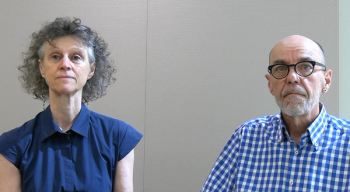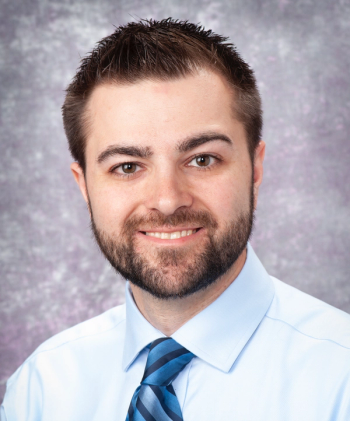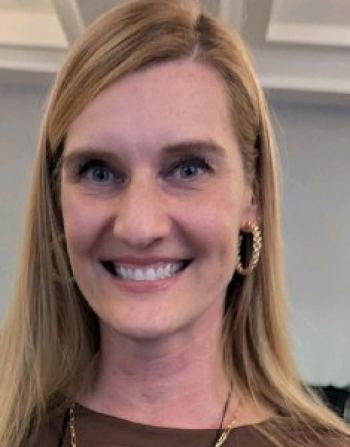
Invivyd’s Chief Scientific Officer Robert Allen, PhD, provides insights on the company's investigational monoclonal antibody, VYD2311, as well as its REVOLUTION clinical program.
John Parkinson is the assistant managing editor for Contagion. Prior to joining MJH Life Sciences in 2020, he has covered a variety of fields and markets including diabetes, oncology, ophthalmology, IT, travel, and local news. You can email him at jparkinson@mjhlifesciences.com.

Invivyd’s Chief Scientific Officer Robert Allen, PhD, provides insights on the company's investigational monoclonal antibody, VYD2311, as well as its REVOLUTION clinical program.

IDWeek Chair, Infectious Diseases Society of America, Yohei Doi, MD, provides some insights on the happenings at this year’s event.

Veronique Dartois, PhD, and Thomas Dick, PhD, discuss the multidrug resistance associated with non-TB mycobacteria and their research, which focuses on developing a novel version of this class of antibiotics for these infections.

Barry Kreiswirth, PhD, discusses how taking an approach similar to that for streptococcal pneumonia can be applied to a potential Klebsiella vaccine.

The Center for Discovery and Innovation’s Barry Kreiswirth, PhD, discusses this emerging challenge that is ongoing in both the community and healthcare settings, especially around resistant urinary tract infections and how this type of resistance can grow exponentially across strain and pathogens.

David Perlin, PhD, chief scientific officer and executive vice president, the Center for Discovery and Innovation (CDI), talks about his team’s work around developing a diagnostic for Candida auris, and what they are working on in terms of developing antifungals.

The Center for Discovery and Innovation’s chief scientific officer David Perlin, PhD, discusses the factors for the growing number of cases and the difficulties in developing such treatments.

The center’s chief scientific officer David Perlin, PhD, provides some insights on the evolution of its antiviral program from its foundation in treating COVID-19 to addressing all pan-coronaviruses.

William Schaffner, MD, provides more context to the committee’s vaccines recommendations.

Recce Pharmaceuticals has begun its study for this indication in Indonesia with its investigational product, RECCE 327 topical gel (R327G).

Jacinda Abdul-Mutakabbir, PharmD, MPH, describes the university's atmosphere, students' involvement in community-based care, and the support they receive.

William Schaffner, MD, reviews clinical workup, treatment, and preventative measurements.

Nimish Patel, PharmD, discusses UC San Diego’s care offerings in HIV, the challenges of getting care to marginalized populations, and what the addition of lenacapavir means to individuals looking to access PrEP.

Jennifer Le, PharmD, MAS, FIDSA, FCCP, FCSHP, discusses her collaboration on this innovative work with this therapy in severely ill children.

Jennifer Le, PharmD, MAS, FIDSA, FCCP, FCSHP, talks about her work on the 2020 vancomycin guidelines for children as well as her efforts to implement Bayesian therapeutic drug monitoring for children in Vietnam.

In our continuing conversation with Victor Nizet, MD, he discusses how his laboratory is studying how to repurpose antibiotics that susceptibility testing had shown to not be efficacious against certain infections.

Victor Nizet, MD, talks about some of the work his laboratory is exploring, including how they want to take a similar approach to cancer treatment when developing antibiotics as well as the need to modernize susceptibility testing to reflect treatments' true utility.

Infectious disease pediatrician Sharon Nachman, MD, offers insights on what is already being done in clinical practice with regards to vaccines, the CDC committee's votes on the MMRV and hepatitis b vaccines, and understanding how they will affect these immunizations going forward.

Victor Nizet, MD, discusses how students can thrive at the university’s Skaggs School of Pharmacy and Pharmaceutical Sciences. He discusses the school's features including its rigorous coursework, focus on research, and community-based health care opportunities.

The non-vote leaves the current immunization recommendation in place, but led to further debate amongst the CDC's ACIP panelists on the hepatitis B vaccine as well as questioning the current process of the delivery of data and whether they would be utilizing working groups and grading studies.

The committee voted to change the MMRV vaccine recommendation, left panelists uncertain around a second MMRV immunization vote, and delayed the hepatitis B vaccine vote until Friday.

Ryan Shields, PharmD, MS, discusses the challenges of incorporating newer antibiotics for gram-negative infections, how he is using broad-spectrum antimicrobial agents for these infections, and the factors he looks for in considering new agents.

Monica V. Mahoney, PharmD, BCPS, BCIDP, FCCP, FIDSA, FIDP, FMSHP, provides insights on the outpatient side of therapy, including treating outpatients for gram-negative infections.

Rodney E. Rohde, PhD, SV/SM/MB(ASCP)CM, FACSc, offers some insights on the latest diagnostics, susceptibility testing for newer antimicrobials, and how infectious disease clinicians and laboratory professionals can collaborate on challenging cases.

The Los Angeles County Department of Public Health updated the public on the specific local case and reminds everyone of the importance of vaccination to protect the community.

Daniela Weiskopf, PhD, of the La Jolla Institute for Immunology, discusses her research in this area including the unique findings and pathways for therapeutics.

Merck reported the results for its phase 3 trial for its vaccine, Capvaxive, which was found to be noninferior to the pneumococcal 23-valent polysaccharide vaccine (PPSV23) for each of the 12 serotypes shared between the vaccines.

In the second installment of an interview with Jacinda Abdul-Mutakabbir, PharmD, MPH, she continues the discussion around limited to no health care engagement due to these factors, and the importance of translating data from the bench to bedside when looking at disease and infection prevention.

Jacinda Abdul-Mutakabbir, PharmD, MPH, provides insights on her recently published study on this topic and how the 2 are connected.

Michael Herce, MD, MPH, MSCR, discusses this concept and how it works to improve access to healthcare for populations who have been disproportionately burdened by various infectious diseases such as HIV, tuberculosis, and COVID-19.